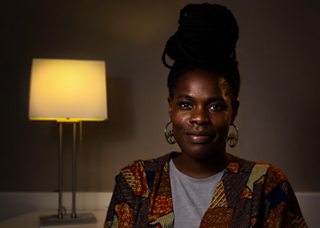Things we learned from some tricky conversations
Every week on Tricky, four guests spend half an hour discussing difficult questions away from the bear pit of social media. From lockdown and conspiracy theories to Black Lives Matter and the Karen meme, nothing is off-limits, and no one goes unheard.
Here are seven things we learned from listening to some tricky conversations:
1. Your assumptions might be proved wrong
For online sex worker Amber Reed, dominatrix Megara Furie, Onlyfans content creator Ross and retired 'full service' sex worker Lucy, sex work, like any other job, has its highs and lows. It can be enjoyable and lucrative but also pretty boring.
“I think a lot of people assume that as a dominatrix I just lie about in latex waiting for the phone to go when in actual fact there’s a lot more to it.” says Megara. “There’s admin, there’s tax returns, there’s emails, there’s marketing, there’s social media, there’s creating content, there’s editing, you know the list is endless.”
As with other jobs, some panellists found it complicated their personal relationships, while others didn’t. Still, sex work is a “highly politicised” job. “There’s still huge stigma around it, and a lot of people are very against it. And it’s okay to be against it but not to shame someone or be horrible to someone because of their profession and the thing that they enjoy.”
Listen to: Is sex work just a job?

2. Your actions may have a wider impact than you realise
Addressing someone with the correct pronoun (e.g. he, she or they) is a demonstration of respect. Misgendering can be especially painful for trans and non-binary people, even when it is accidental. "It’s the history of that misuse of pronouns from your past which makes it so painful,” explains Victor Lockhart.
Itβs the history of that misuse of pronouns from your past which makes it so painful.
Gray Crosbie says: “I think when you are spending so much time worrying about passing, and then someone accidentally misgenders you, I think that’s when it does really hurt because you think well, I’ve not done this well enough.”
So, what should we do if we accidentally misgender someone? “You immediately correct it,” the panellists say. “Don’t make a fuss about it.” They also appreciate when cisgender people normalise stating their pronouns. “If everybody did this it would make trans folks’ lives so much easier when it comes to stating our pronouns, especially when your pronoun maybe wouldn’t be what people would automatically assume.”
Listen to: Are pronouns important?
3. Words can mean different things to different people
For some, feminism is about women’s specific needs and desires; for others, it's about abolishing gender, and for others still, it is about freeing people of all genders and none from patriarchy and other forms of oppression.
Some our panellists use the term TERFs – or trans-exclusory radical feminist – to call out feminists they believe to be exhibiting transphobic behaviour. However, others feel the term is “being weaponised against women who have questions and concerns about where the trans movement is going.”
Despite their differing stances, they all agree that dialogue is important. “When discussion is closed, nobody wins,” says relationship educator Esther De La Ford. “Trans women don’t win, cis women don’t win, women of colour don’t win, nobody wins when the conversation is shut down.”
Listen to: Is TERF a slur?
4. Intention matters but consequences do too
Finlay Wilson was teaching a yoga class when police officers walked in. Finlay had posted about his mental health on social media and a concerned follower had reported him to the police as a suicide risk. While the panellists appreciated that the follower was trying to help Finlay, their actions were misinformed. “They don’t understand what being sectioned entails and how traumatic that can be for so many people and for so many people’s families.”
Finlay explains: “I’ve now been funnelled back into the NHS mental health system because I was having a bad day and decided to write about it on World Mental Health Day”.
The panellists argue people are still afraid to talk about depression which contributes to misconceptions and misinformed actions. They say more needs to be done to tackle stigma and improve mental health education.
Listen to: Why is depression still stigmatised?
5. We can all choose what attitude we take
We all know that the one guarantee in life is death, so why is dying seen as a failure? Our panellists argue that euphemisms like “lost their battle” devalues the experience of dying. John McGrogan spent a year on a paediatric cancer ward; he describes the heroism of his peers who died from cancer. “She was a fighter till the very end,” says another panellist reflecting on her friend’s death.
Kirstie Bryce was forced to come to terms with death when her mother died by suicide. “You hear the phrase, ‘Oh, no one wants to die’, but then all of a sudden you’re confronted with, well what if someone does?” Still, she tells the other panellists: “I don’t think I could look at her death as her failing in any way.”
“Death, it has to impact everyone’s life in some way but its your choice whether its for the good or the worse, whether you act out of fear from it or whether you almost embrace it and take a somewhat… not an optimistic view… but you almost kind of take the power from it.”
Listen to: Have we got the wrong attitude to death?
6. Words are tools for both healing and harm
“It’s really important to be able to challenge views, because in a lot of cases we’re missing opportunities to help people to grow,” says Megara Furie. For the Tricky panellists, the danger of cancellation is that it won’t eradicate the existence of problematic or harmful beliefs; it will simply make them taboo and push them underground.
Writer Vanessa Kisuule points out: “People are walking on eggshells because they don’t want to be fired from their jobs; they don’t want to be seen as a bad person. They’re not actually trying to be a better person, they’re not actually having that process of self-examination, of self-betterment.” Still, she asserts: “There are people out there using words to weaponise, discriminate and belittle, and I think there are certain points where we have to put our foot down on that.”
Listen to: Has cancel culture gone too far?

7. We all have influence
Many people are wary of the rise of online activism. “The fear with online activism is it becomes really performative, it becomes about wanting part of something,” says creative director David Chukwujekwu. “Being performative undermines the movement because you can misrepresent it so easily… in a way that can actually be harmful to the movement.”
It really doesnβt matter what size your audience is, it matters that thereβs an audience there.
The panellists agree that many organisations, commercial brands, and online influencers are guilty of performative activism. Still, sometimes influencers feel pressured into performative activism. "People were asking me, ‘Why aren’t you making a video about Black Lives Matter?’” shares Youtuber Kirstie Bryce. “Just because I didn’t publish a video on it, didn’t mean that I didn’t post on my other social medias about it, didn’t mean I didn’t go away and learn and speak with my friends and have really uncomfortable, difficult conversations with my family and other people.”
Still, all our panellists believe that online activism can be incredibly powerful. "Whether you’ve got a hundred people that listen to you, you’ve got a hundred thousand people or a million people. It really doesn’t matter what size your audience is, it matters that there’s an audience there.”
Listen to: Does online activism achieve anything?
More from Tricky
-
![]()
Tricky
Listen to all episodes of Tricky. Every week four guests spend half an hour discussing the issues facing society. Nothing is off limits and no one goes unheard.
-
![]()
Are young people paying the price for lockdown?
Who is suffering most from lockdown restrictions?
-
![]()
Is it time for cancel culture to be cancelled?
A tap of the thumb could be all it takes to destroy a reputation.
-
![]()
Black Lives Matter: A Movement or a Moment?
Musician Ransom FA discusses Black Lives Matter's purpose as a rallying call.




